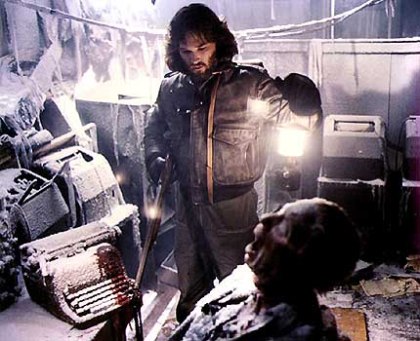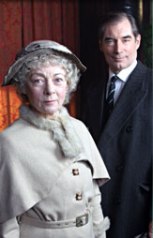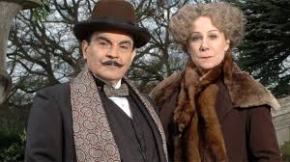
This is not at all a review.
Disclaimer out the way, all I know about this post is my starting idea. I have a feeling of where I’d like to end up, what point I would like to finish on, what feeling I would like to create with my words, but I’m not sure yet how to get there. We’ll see.
Yes, you can see a point emerging on the horizon. I wish to write about the oft-made complaint, usually directed at once-popular and thriving, once-sources of of inspiration and new ideas in storytelling, that they’re making it up as they go along. They being the creators. Writers, directors, producers, whoever. They who deliver the story to us, as we sit there forever yelling out from our couches for Berk to feed us.
So why the complaint? Probably because the show (this is by and large a post about TV shows, though it sometimes does creep into discussion about films) has started to push a few too many elements of the story a wee bit too far with their patient faithful. The audience becomes conscious. ‘We can see what you’re doing!’ they cry. They can see the inevitable ending aversion, utilised by so many storytellers who just love to tell their story. Don’t get to the ending too soon, keep delaying this and give everyone the satisfaction of living in the world of the story just that little bit longer. Bad stories do this badly. Good stories – and now I’m going to mention Lost – do this well. Keep spinning the plates, but introduce more and so we don’t notice as the first plates start to fall. But the more plates, the bigger the crash at the end. And this happened with Lost. Outrage, fury, everyone claiming that they knew it all along, they knew it in their hearts, that the Lost creators were just making it all up as they went along.
Which is horseshit.
We’ll stick with Lost for several reasons. One is because it did storytelling well. Another is that it faced probably the biggest backlash of the type mentioned above. A final reason is because I still think it was a fantastic show that ended the way it always wanted to and ended perfectly and my life is wonderful thank you.
Lost did set up far too many mysteries. It thrived on it. And it did become far too enamoured in its ability to spin more and more mystery and confusion into the mythology in a way that seemed perfectly in keeping with the type of show it was. And the audience loved it. But at some point (Season Three) the nagging doubt crept into the audience’s hivemind that perhaps this was spinning out of control (again with the plates), and everyone wondered where it was all going.
And this continued, even through the exceptionally strong fourth, fifth and final seasons. And despite the finale – the staggering, brilliantly ineffable finale – the lasting memory for a majority of the audience is that they just bumbled their way through making things up, and hashed some claptrap together in a weepy ‘Look over there!’ series ending.
But is this such a bad thing?
Is it bad, to make things up as you go?
Why do we not like it?
I think it comes down to a sort of uncanny storyteller valley. The audience want to be spirited away to the imagination of the creator. And that imagination must be fully formed. It must be complete. It must convince. I mustn’t at any point seem like a lie (which it is). We enter into stories, books, films aware that we are participating in a bargain with the creator. Here’s our money now make us forget we gave it to you. We have an unconscious act of forgetting the conscious. ‘Tell us a story but don’t tell us that you’re telling us a story!’ If we get too close to the telling, to close that we can see the grotesque cracks in the corners, the wires holding Superman up, the zipper on the monster suit, we cry foul and go look for something that does it better.
Stories, like Lost, that appear to show a preparedness to organically evolve (like life!) run risk of drawing attention too much to their process of telling a story. Heaven forbid a story that is thought of, written, rewritten, rehearsed, performed, edited, broadcast over a seven year period should dare to evolve as it goes.
Yes shows like Lost have inconsistencies. And yes it flagged midway due to a myriad of reasons (sloppy writing, lack of direction from the show runners and so on). And yes, it didn’t answer everything it set itself up to. Mysteries went unexplained. But come on. In rewatching the opening season, the episodes that resonated so much, the moments that displayed strength and clarity of storytelling unlike many TV shows, all seemed a little simplistic. A little obvious. Cartoonish, almost. Even the moments from the first like the Locke-wheelchair revelation and the light in the hatch are basic in the deftness of their storytelling when held up against the Penny-Desmond moments through seasons 4 to 6, and Alpert’s backstory in the final few episodes. The show evolved, the characters with it, but so did the audience. Stories have to get better, have to become more complex and sophisticated, if they are to go on for a long time, because we do as we listen to them. The audience expects more. Demands it.
It would be prudent, then, to evolve as a storyteller in kind. There will be false steps, there will be inconsistencies, but all these stories are asking is that we forgive the odd zipper and smoke and mirrors, and just go with it. It’s what we’re there for in the first place.
Stories are made in the telling of them.



